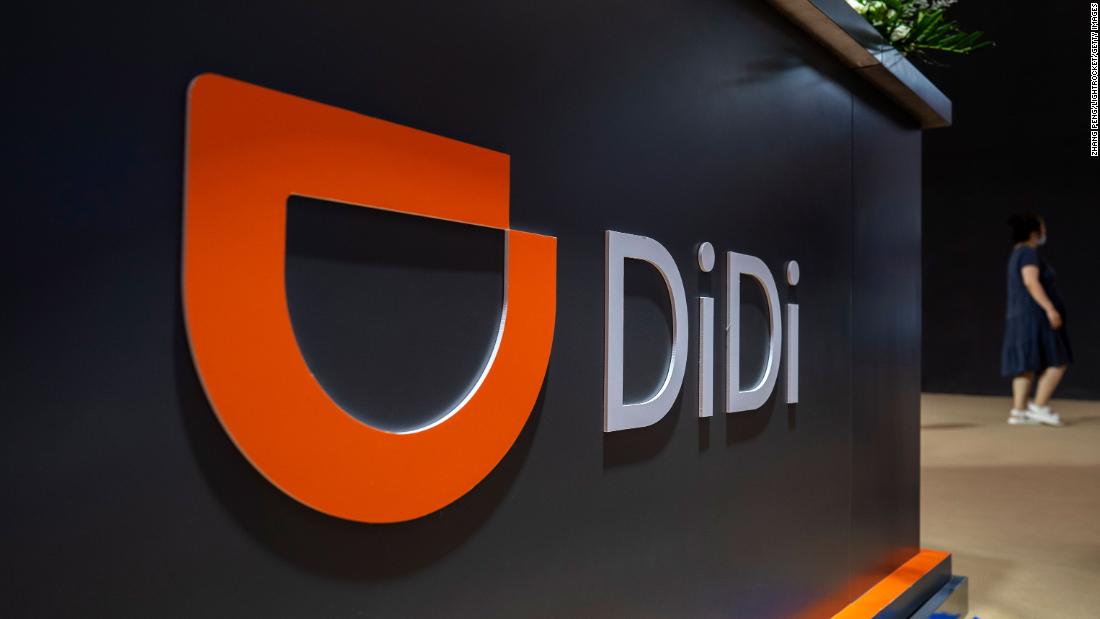
Hong Kong (CNN Business)Chinese ride-hailing giant Didi wants to bail on Wall Street. It may soon have plenty of company.
For China's big tech firms, the appeal of going public in New York was once obvious: They gained access to a much deeper pool of capital, higher valuations and more relaxed listing rules. But that is quickly fading as they're forced to navigate a slew of audit rules and sanctions from Washington, coupled with Beijing's heightened scrutiny on data collection and foreign listings.
The pressure from both nations has created a "perfect storm" of problems for these companies, according to Alex Capri, a research fellow at the Hinrich Foundation. He called Didi's move a "harbinger of [the] increased fragmentation of global financial markets along geopolitical lines."
Didi's announcement last week — that it would "immediately" start the process of delisting from the New York Stock Exchange and pivot to Hong Kong — wasn't a surprise.
The company became a poster child of Beijing's crackdown on tech companies after the government banned Didi from app stores just days after its June IPO on the New York Stock Exchange. Authorities at the time accused Didi of breaking privacy laws and posing cybersecurity risks. Their actions were also widely seen as punishment for the company's decision to go public overseas instead of in China.
A course correction
Moving to Hong Kong marks an abrupt course correction for Didi. Fellow tech giant Alibaba (BABA) was celebrated two years ago for listing its shares in the Chinese city — a symbolic homecoming for a company that in 2014 went to New York to launch the world's then-biggest IPO.
Several other US-listed firms, including Baidu (BIDU), NetEase (NTES) and JD.com (JD), also now trade in Hong Kong, but none of those big names have yet to mirror Didi's decision to pull out of New York entirely.
They might be forced to reconsider soon.
Beijing has taken steps this year that seem intended to discourage Chinese companies from trading in foreign markets, which the country fears could pose risks to national security.
In the weeks after Didi's IPO, Chinese authorities proposed that companies with data on more than 1 million users seek approval before listing overseas. And earlier this week, the Financial Times reported that China is expected to "tightly restrict" the ability for companies that use a structure called a variable interest entity, or VIE, to raise money from foreign investors.
A VIE involves creating an overseas holding company that allows investors to own a stake in a Chinese company that would otherwise be difficult because of restrictions in the mainland. Companies like Didi, Alibaba, Pinduoduo and JD.com have all benefited from the system.
"The light at the end of the tunnel continues to be the train coming the other way," wrote Jeffrey Halley, senior market analyst for Asia Pacific at Oanda, in a note this week. "It is increasingly clear that China is giving the option of Hong Kong or bust with regards to pseudo overseas listings, with the riches of US valuations being closed off."
Pressure from Washington
Washington has also tightened the screws on companies from the world's second largest economy. Last week, the US Securities and Exchange Commission finalized rules that would allow it to delist foreign firms that refuse to open their books to US regulators. China has for years rejected US audits of its firms, citing national security concerns.
While Alibaba, Baidu and JD.com have already hedged their bets by listing in Hong Kong, there are a few big names that haven't yet followed suit. Capri pointed out that e-commerce firm Pinduoduo (PDD) and electric vehicle maker Nio (NIO) only trade in New York, and thus "have a higher degree of exposure than those with diversified trading options."
"These firms risk becoming pawns in a growing tit-for-tat between Beijing and Washington," he added.
Shares in Chinese companies have been hammered over the last year as China cracks down on tech and other private enterprise.
There are tensions on the horizon that could make trading in New York even more untenable for Chinese companies, according to Capri. He cited the Biden administration's diplomatic boycott of the 2022 Beijing Winter Olympics and human rights-based sanctions against Chinese entities, which he said "could invite Chinese reprisals that would include depriving US financial markets of other Chinese firms' listings."
Further down the road, Capri noted that Beijing's efforts to roll out a government-backed digital currency could create further obstacles for Chinese companies to list in foreign markets.
"The Chinese state will gain total control of financial data and transactional data" through that program, he said. "Chinese firms, by association, will become suspect for data surveillance and privacy issues. This, in turn, could lead to higher barriers to entry in US and other markets."
"street" - Google News
December 09, 2021 at 07:13PM
https://ift.tt/3EHxYRU
Didi is leaving Wall Street. A 'perfect storm' means other Chinese tech stocks may follow - CNN
"street" - Google News
https://ift.tt/2Ql4mmJ
Shoes Man Tutorial
Pos News Update
Meme Update
Korean Entertainment News
Japan News Update


No comments:
Post a Comment